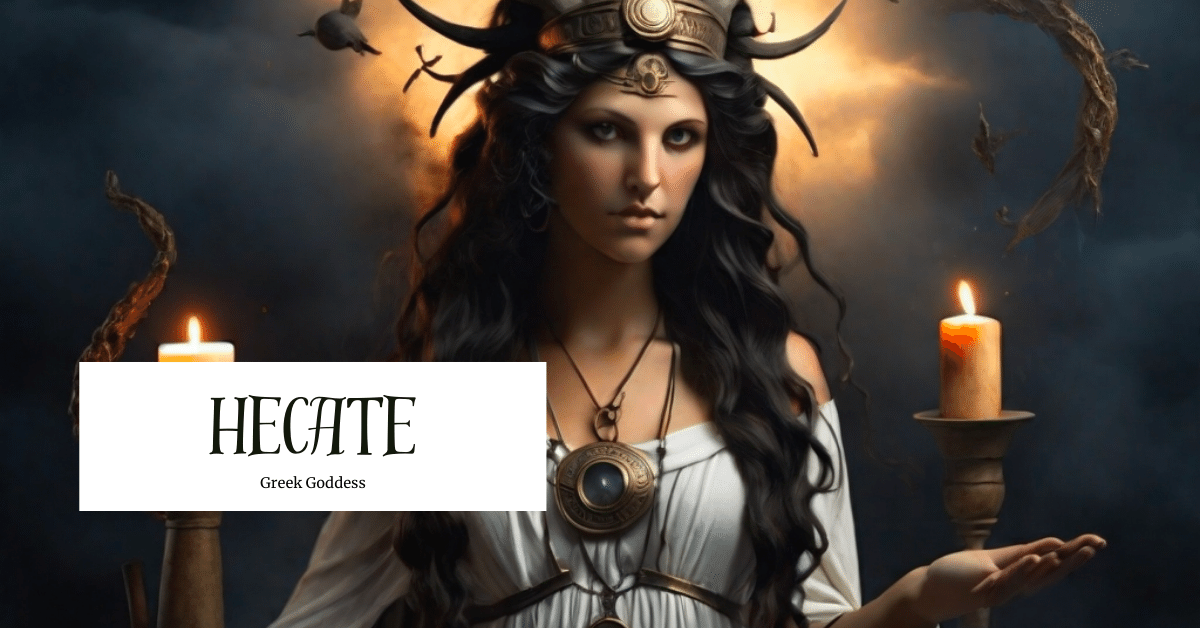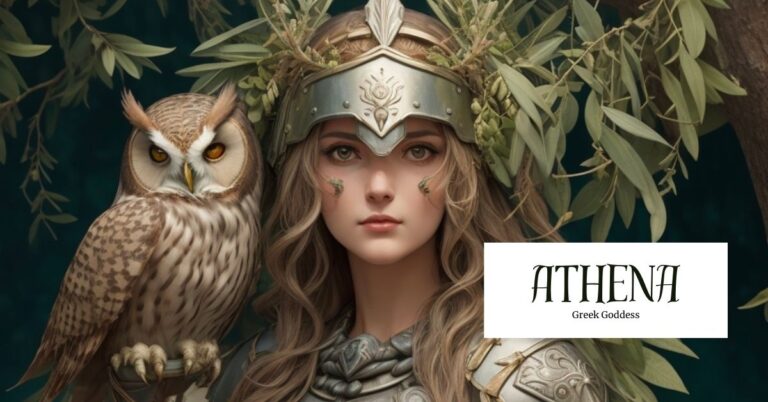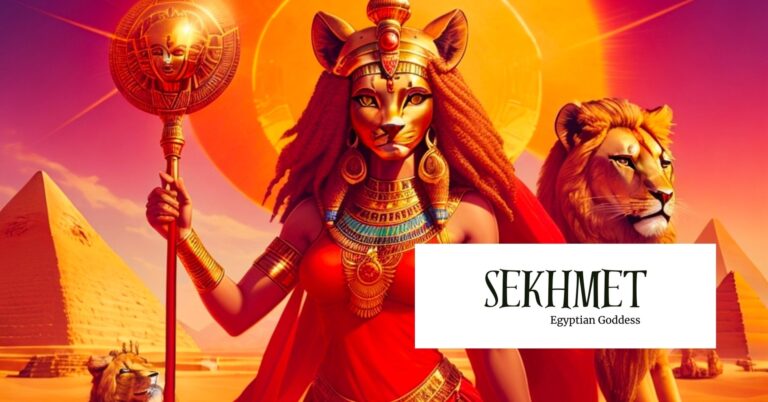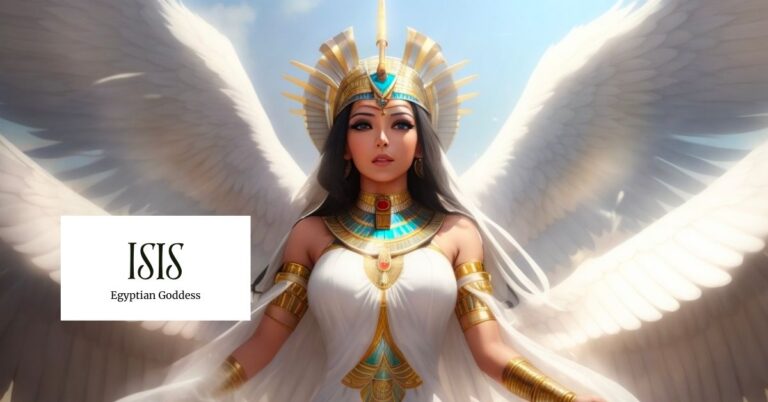Hecate: Goddess of Magic, Witchcraft, and the Night
The Greek goddess Hecate exudes an aura of mystery that transcends mere divinity. Reigning over the crossroads of fate, the world of magic, and under the shroud of night, every step on her winding path evokes curiosity and draws us closer to uncovering her secrets. Welcome to the world of Hecate, where the boundaries between reality and myth blur into a beguiling tapestry of wonder and reverence.
Overview of Hecate
Hecate takes many names, including Trivia (Roman counterpart) and Hekate Brimo, which reflect her many roles. Primarily associated with magic, night, and the crossroads, the goddess represents a fascinating blend of celestial and earthly influences. Her significance extends beyond mythology, permeating many aspects of ancient Greek culture and belief systems (Cartwright). Her name itself is significant, as it comes from the Greek word “Ἑκάτη” (Hekátē), which connects her etymologically to concepts of power that reach far and wide (Atsma).
Source: Pinterest
Titles
- Goddess of Magic
- Moon Goddess
- Queen of the Night
Abilities
The mysterious goddess of the night possesses a formidable range of abilities that underscore her dominion over the mystical and otherworldly. One of her most distinctive abilities is the power to illuminate the darkness. Depicted frequently carrying torches, she serves as a guiding force, a beacon of hope in the obscurity of the night.
Hecate’s mastery of magic is another aspect of her unparalleled abilities, endowing her with the capacity to bestow blessings and curses (Kapach). Her command over the arcane arts makes her a revered figure among practitioners of magic and witchcraft. Through her magical prowess, she wields the power to shape destinies, bless endeavors with success, or invoke curses upon those who cross her path.
Furthermore, Hecate’s role as a crossroads guardian allows her to influence choices and fate (Wikipedia Contributors). At pivotal decision-making moments, she is invoked by those seeking guidance and protection. Her presence is believed to help individuals navigate the complexities of life’s crossroads, ensuring that their choices align with their true destinies. Lastly, her connection to the moon endows her with lunar powers, enabling her to shape the tides, influence dreams, and govern the cycles of nature (Cartwright). This celestial association deepens her mystique and underscores her significance as a goddess intricately intertwined with the cosmic forces that govern the natural world.
Characteristics
Hecate’s appearance and demeanor reflect her divine role as a goddess of magic and the night. She is often depicted as a mature woman with three faces, symbolizing her threefold nature as a maiden, mother, and crone. This imagery emphasizes her all-encompassing presence in the areas she oversees. Her attire features lunar motifs, highlighting her connection to the moon, and she is frequently depicted holding torches or serpents, representing her strength and authority.
Source: Pinterest
Traits
Despite her eerie reputation, Hecate is a deeply protective figure who watches over those who invoke her. She guides them through the complexities of life and offers comfort and protection to those who seek her counsel (Atsma). This dual nature of being both mysterious and protective adds depth to her character, showcasing her ability to bewilder and reassure.
Additionally, independence and self-reliance are defining traits of Hecate. As a solitary goddess, she is often depicted wandering alone at night. This independent streak further adds to the intrigue surrounding her and underscores her status as a deity who answers to no one but herself (Cartwright). Finally, Hecate’s role as a goddess associated with decisions and choices imbues her with a reputation for being just and fair (Wikipedia Contributors). She ensures that justice prevails at critical crossroads where fates are determined and destinies are shaped. Her role as a moral arbiter adds another layer of complexity to her personality, portraying her as a goddess who embodies not just the mystical but also a sense of ethical duty.
Symbols
Hecate is closely associated with various powerful symbols representing her diverse nature and roles in the mystical and everyday worlds. One of her most recognizable symbols is the torch, which embodies her as a guide in the dark, a protector of those who journey through uncertain paths (Wikipedia Contributors), and a source of enlightenment that dispels ignorance and reveals hidden truths. Dogs also hold great significance as symbols associated with Hecate. These loyal companions are often depicted accompanying her, representing her connection to the spirit world and her ability to see beyond the physical realm (Kapach). They are believed to assist Hecate in navigating the supernatural, highlighting her role as a guardian and guide in the mystical dimensions.
Serpents are another symbol that holds a significant place in Hecate’s iconography (Atsma). As symbols of transformation, they emphasize her role as a goddess of magic and her ability to bring about profound changes in both the natural world and the human psyche. Their presence in her symbolism reinforces her connection to the arcane arts and the transformative power they hold. Lastly, the crossroads hold a potent symbol of choice and destiny and are deeply associated with Hecate (Kapach). Her presence at these intersections of fate highlights her pivotal role in guiding individuals through life-altering decisions. As a goddess who governs these moments, she is invoked by those seeking her wisdom and protection.
Source: Pinterest
Festivals and Rituals
Throughout history, Hecate has been revered and celebrated through various festivals and rituals in ancient Greek culture and belief systems. One of the most notable rituals dedicated to Hecate is the “Hecate’s Deipnon,” observed monthly during the dark moon. Devotees leave food offerings, particularly garlic and honey, at crossroads as a gesture of respect to appease Hecate and seek her protective blessings (Cartwright). Another significant tradition is the “Hecate’s Suppers,” which are held during her festivals on the 30th day of each lunar month. Participants leave food offerings at a crossroads to honor the goddess and gain her favor (Kapach). This practice reflects the ancient belief in reciprocation, where offerings were made to Hecate in exchange for her guidance, protection, and blessings. It also underscores the enduring devotion and reverence accorded to Hecate by her devotees, who sought her presence and favor in their lives.
“Hecate’s Night” is another renowned annual celebration dedicated to the goddess, observed on the 16th of November. This event marked the end of the harvest season and held special significance for agricultural communities. Rituals and offerings were made to thank Hecate for a bountiful harvest and seek her future blessings (Wikipedia Contributors). The transition from autumn to winter was a critical time, and Hecate’s role as a goddess of change and transformation was particularly invoked during this period.
Hecate also played a significant role in the “Mysteries of Eleusis,” a sacred initiation ceremony in ancient Greece. Her presence in these mysteries symbolized the transition from life to death and underscored the importance of her guidance in the afterlife (Atsma). This association with the mysteries highlights Hecate’s influence in the spiritual and mystical realms, emphasizing her as a goddess of profound significance in the ancient Greek religious landscape.
Source: Pinterest
Legends associated with Hecate
Hecate, the mysterious Greek goddess of the night, magic, and crossroads, has left an unforgettable legacy on Greek mythology. Her complex personality has been intertwined with various legends and myths, showcasing her power, origins, and enduring significance. In this section, we delve into some of the stories associated with Hecate, shedding light on the variations, intriguing tales, and enigmatic nature that have made her a captivating figure in ancient Greek lore.
Origin story
Hecate has a fascinating origin story that showcases the intricate and often confusing genealogies that are a hallmark of Greek mythology. The various parentage accounts add a layer of complexity to her divine background and contribute to her mystifying character. According to some versions of her origin story, Hecate is the child of Titans Perses and Asteria, placing her in the second generation of Titans (Atsma). This lineage connects her to a family that is known for its cosmic importance, as Titans were considered primordial deities linked to fundamental aspects of the universe.
In this version of her origin story, Hecate’s powers as a goddess of the night, magic, and crossroads are thought to have come from her mother, Asteria, who was closely associated with nocturnal aspects. This link to the night reinforces her role as a deity connected to the mysteries of darkness and the hidden world. Hecate derives her supernatural abilities and unique dominion over the mystical and unknown from this maternal lineage. On the other hand, some sources propose an alternative lineage, suggesting that Hecate is the daughter of Zeus and the Titaness Hecate (Atsma). This lineage makes her the granddaughter of Perses and Asteria and connects her more directly to the ruling deities of Olympus, emphasizing her divine background and the influence of the celestial sphere on her character.
The variations in Hecate’s parentage reflect the complexity and fluidity of Greek mythology, where different traditions and regions often presented their interpretations of divine genealogies. This diversity of narratives contributes to the richness of Hecate’s character and reinforces her status as a multifaceted goddess.
Source: Pinterest
Hecate’s Role in the Myth of Persephone’s Kidnapping
One of the most enduring and significant stories connected with Hecate revolves around her crucial part in the myth of Persephone‘s kidnapping by Hades. This ancient tale is a cornerstone of Greek mythology. Hecate’s involvement adds depth to her character as a protector and guide through the mystical and ordinary domains. According to the story, when Hades, the god of the underworld, took Persephone, the daughter of Demeter, and transported her to his dark world, it was Hecate who heard Persephone’s cries for help (Wikipedia Contributors).
In some versions of the myth, Hecate played a pivotal role in the quest for Persephone. Demeter, Persephone’s distressed mother, and goddess of agriculture, set out to locate her daughter. With her torches in hand, Hecate joined the search, lighting the dark paths of the underworld and guiding Demeter through its winding paths (Wikipedia Contributors). Hecate’s torches, symbolizing her role as the illuminator of the night and the protector of those in need, were instrumental in this mission for Persephone. This tale emphasizes Hecate’s association with the underworld, her ability to navigate its shadows, and her role as a protector and guide in times of crisis. It also highlights her unique position as a deity who straddles the boundaries between life and death, light and darkness, and the ordinary and the mystical.
Source: Pinterest
Gigantomachy: Helping the Gods
Hecate was crucial in the Gigantomachy, the legendary fight between the Olympian gods and the Giants. This tale further emphasizes her power as a magical and mystical goddess. During this epic battle, the Giants aimed to overthrow the Olympian deities and take control of the cosmos. Hecate emerged as a pivotal figure at this critical moment in Greek mythology, offering her supernatural aid to the gods (Kapach).
Her remarkable magical abilities define Hecate’s contribution to the Gigantomachy. She summoned various creatures, such as bees, scorpions, and other formidable beings, which she unleashed upon the Giants (Kapach). These creatures, guided by Hecate’s mystical influence, served as powerful allies in the battle against the Giants, adding a supernatural dimension to the gods’ arsenal. Hecate’s willingness to use her magic to defend the Olympians highlights her role as a goddess of magic and her dedication to assisting the divine forces in their struggles.
The legend of Hecate’s involvement in the Gigantomachy emphasizes her significance as a guardian of the gods and a valuable ally in times of cosmic conflict. Her ability to manipulate the forces of magic and conjure creatures to aid in the battle illustrates her character as a deity who can shape destinies, protect the divine order, and navigate the intricate balance between mortals and gods. This legend adds depth to Hecate’s character, positioning her as an invaluable asset in the pantheon’s battles against formidable enemies.
Source: Pinterest
Influences of other religions/cultures on Hecate
Throughout history, various religions and cultures have shaped Hecate’s worship and characteristics. One significant influence was her inclusion into the Roman pantheon, where she was connected with Trivia, a Roman goddess who guarded Crossroads and offered guidance in matters of magic. This blending of Greek and Roman mythology increased Hecate’s influence and recognition in the Mediterranean (Cartwright).
Hecate’s following and qualities have also influenced Western esoteric traditions and modern pagan practices. Her association with the moon, magic, and the occult has made her a prominent figure in contemporary witchcraft and neopaganism. In modern rituals and spells, Hecate is often invoked as a guide through the mysteries of the unseen and a source of mystical knowledge (Atsma).
Modern appearances
Hecate’s influence has remained strong through the ages, and she remains a significant figure in modern times. Her portrayal in literature, art, and film as a powerful goddess of magic and the night only adds to her enigmatic nature. Her relevance in contemporary storytelling and artistic expression shows that she has transcended time and continues to impact modern culture profoundly.
In addition, Hecate’s presence in modern pagan and Neopagan practices demonstrates her continued importance in spiritual exploration. Her role as a guide in moments of decision-making and destiny-shaping is still highly respected and revered. Her symbols, such as the torch and the crossroads, are still used in contemporary rituals and ceremonies to connect with her energy and wisdom (Cartwright), bridging the gap between the past and present. Hecate’s enduring significance as a guardian of the mystical and unknown continues to captivate and inspire, proving that her influence is timeless.
Source: Pinterest
Final thoughts
Hecate’s enigmatic persona and spiritual presence continue to capture the imagination of people worldwide. From her origins as a mysterious goddess in Greek mythology to her enduring symbolism as a guide through the unknown, Hecate remains a timeless symbol of wisdom, power, and magic. Her legacy serves as a reminder of the importance of embracing the mysteries of life and the choices we make at the crossroads.
References
Atsma, Aaron J. “HECATE (Hekate) – Greek Goddess of Witchcraft, Magic & Ghosts.” Theoi.com, 2017, www.theoi.com/Khthonios/Hekate.html.
Cartwright, Mark. “Hecate.” World History Encyclopedia, 22 June 2017, www.worldhistory.org/Hecate/.
Kapach, Avi. “Hecate.” Mythopedia, 9 Mar. 2023, mythopedia.com/topics/hecate.
Wikipedia Contributors. “Hecate.” Wikipedia, Wikimedia Foundation, 7 Nov. 2019, en.wikipedia.org/wiki/Hecate.





